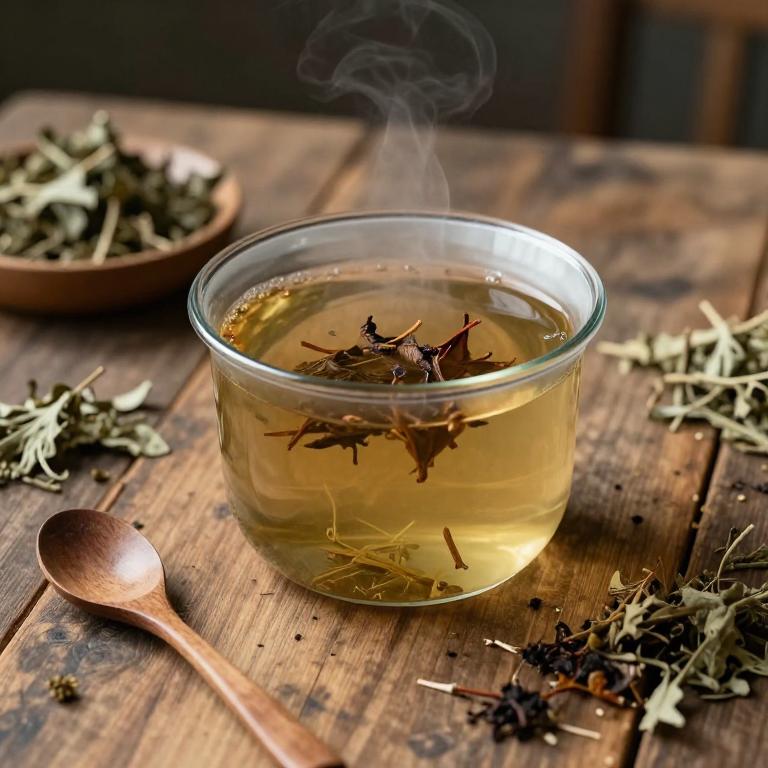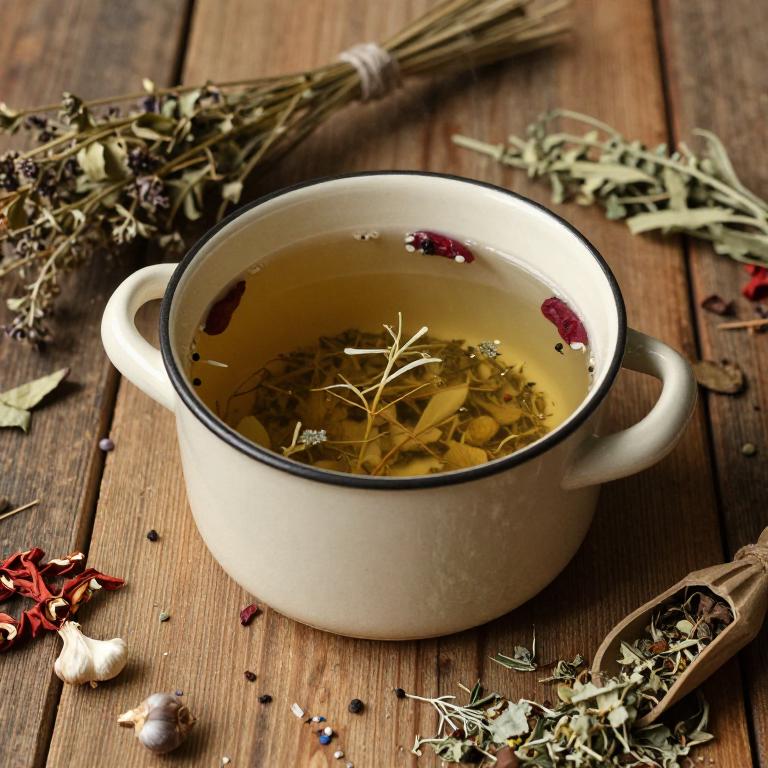10 Best Herbal Decoctions For Chapped Lips

Herbal decoctions for chapped lips are traditional remedies made by simmering specific herbs in water to extract their beneficial properties.
Commonly used herbs include licorice root, chamomile, and calendula, which are known for their soothing and moisturizing effects. These decoctions can be applied directly to the lips using a clean cloth or cotton swab to provide relief from dryness and irritation. The anti-inflammatory and antioxidant properties of these herbs help to nourish and protect the lips' delicate skin.
Regular use of herbal decoctions can improve lip hydration and promote overall skin health.
Table of Contents
- 1. Marigold (Calendula officinalis)
- 2. Aloe vera (Aloe barbadensis)
- 3. St. john's wort (Hypericum perforatum)
- 4. Stinging nettle (Urtica dioica)
- 5. Ginger (Zingiber officinale)
- 6. Dog rose (Rosa canina)
- 7. Field horsetail (Equisetum arvense)
- 8. Chaste tree (Vitex agnus-castus)
- 9. Chamomile (Matricaria chamomilla)
- 10. English lavender (Lavandula angustifolia)
1. Marigold (Calendula officinalis)

Calendula officinalis, commonly known as pot marigold, is a flowering plant widely used in herbal medicine for its soothing and anti-inflammatory properties.
Herbal decoctions made from calendula officinalis can be particularly effective for treating chapped lips due to their ability to moisturize and promote skin healing. To prepare the decoction, dried calendula flowers are simmered in water for about 15 to 20 minutes, creating a gentle infusion that can be applied topically. This natural remedy is gentle enough for sensitive skin and can help reduce dryness, redness, and irritation associated with chapped lips.
Regular use of calendula officinalis decoctions may provide long-term relief and improve the overall health of the lips.
2. Aloe vera (Aloe barbadensis)

Aloe barbadensis, commonly known as aloe vera, has been widely used for its soothing and healing properties, including in the form of herbal decoctions for chapped lips.
These decoctions are typically prepared by simmering the gel or leaves of the aloe plant in water, allowing the beneficial compounds to infuse into the liquid. The resulting decoction is rich in nutrients such as vitamins, enzymes, and antioxidants, which help to moisturize and repair damaged lip skin. Applying the decoction directly to chapped lips can provide immediate relief by reducing inflammation and promoting tissue regeneration.
Due to its natural and gentle nature, aloe barbadensis decoctions are often considered a safe and effective alternative to commercial lip balms for those seeking a herbal remedy.
3. St. john's wort (Hypericum perforatum)

Hypericum perforatum, commonly known as St. John's Wort, is traditionally used in herbal medicine for its potential healing properties.
When prepared as a herbal decoction, it can be applied topically to chapped lips to soothe irritation and promote skin repair. The active compounds in hypericum, such as hypericin and flavonoids, are believed to have anti-inflammatory and antimicrobial effects that aid in reducing redness and preventing infection. To make a decoction, the dried plant material is simmered in water for several minutes, then cooled and strained before application.
While generally safe for topical use, it is important to consult a healthcare provider before using hypericum perforatum, especially if taking other medications, due to its potential interactions.
4. Stinging nettle (Urtica dioica)

Urtica dioica, commonly known as stinging nettle, has been traditionally used in herbal medicine for its various therapeutic properties.
When prepared as a decoction, it can be applied externally to soothe and heal chapped lips due to its anti-inflammatory and astringent qualities. To make the decoction, fresh or dried nettle leaves are boiled in water for several minutes, then strained and cooled before use. The resulting liquid can be applied directly to the lips with a clean cloth or cotton swab several times a day.
However, it is important to perform a patch test first, as some individuals may experience an allergic reaction to this potent herb.
5. Ginger (Zingiber officinale)

Zingiber officinale, commonly known as ginger, has been traditionally used in herbal remedies for its warming and soothing properties.
When prepared as a decoction, ginger can help alleviate chapped lips by promoting circulation and reducing inflammation. To make the decoction, fresh ginger root is sliced and simmered in water for several minutes, then cooled and applied to the lips with a clean cloth or cotton swab. The anti-inflammatory and antioxidant compounds in ginger may help moisturize and protect the skin, offering relief from dryness and irritation.
While ginger decoctions can be a natural alternative for soothing chapped lips, it is advisable to patch test and consult a healthcare provider if symptoms persist or worsen.
6. Dog rose (Rosa canina)

Rosa canina, also known as dog rose, is a traditional herbal remedy that has been used for centuries to address various health concerns, including skin conditions.
Its herbal decoctions, made by boiling the dried flowers or fruits, are rich in antioxidants, vitamins, and anti-inflammatory compounds that can help soothe and moisturize chapped lips. The tannins present in rosa canina have astringent properties that can help tighten and protect the delicate skin on the lips. When applied topically, these decoctions can reduce dryness, promote healing, and provide a protective barrier against environmental irritants.
However, it is important to use a diluted form to avoid irritation, and consulting with a healthcare provider is recommended, especially for those with sensitive skin or existing health conditions.
7. Field horsetail (Equisetum arvense)

Equisetum arvense, commonly known as horsetail, has been traditionally used in herbal medicine for its high silica content, which is believed to promote skin healing and hydration.
When prepared as a decoction, horsetail can be applied topically to chapped lips to help soothe irritation and improve moisture retention. To make the decoction, the dried herb is simmered in water for approximately 20 minutes, then strained and cooled before application. The astringent properties of horsetail may help reduce inflammation and promote the repair of damaged lip tissue.
However, it is important to perform a patch test first, as some individuals may experience allergic reactions to this herb.
8. Chaste tree (Vitex agnus-castus)

Vitex agnus-castus, commonly known as chasteberry, has been traditionally used in herbal medicine for its potential benefits on skin health.
Herbal decoctions made from vitex agnus-castus are believed to support the body's natural processes that contribute to skin hydration and repair. While primarily used for hormonal balance, some studies suggest that its anti-inflammatory and antioxidant properties may help alleviate chapped lips by reducing irritation and promoting moisture retention. However, more research is needed to confirm its efficacy specifically for this condition.
As with any herbal remedy, it is advisable to consult a healthcare professional before use, especially for those with allergies or existing medical conditions.
9. Chamomile (Matricaria chamomilla)

Matricaria chamomilla, commonly known as chamomile, is a herbal remedy often used in the form of a decoction to soothe chapped lips.
The decoction is prepared by steeping dried chamomile flowers in hot water, creating a gentle infusion that can be applied topically. Chamomile contains anti-inflammatory and antiseptic properties that help reduce irritation and promote healing of dry, cracked skin. When used as a lip balm or applied with a cotton swab, it provides a calming effect and can help moisturize the lips.
However, it is important to ensure that the decoction is cooled before application to avoid burns, and individuals with allergies to plants in the daisy family should use it with caution.
10. English lavender (Lavandula angustifolia)

Lavandula angustifolia, commonly known as English lavender, has been traditionally used in herbal medicine for its soothing and healing properties.
Herbal decoctions made from lavender can be prepared by simmering the dried flowers in water, creating a nourishing infusion that can be applied to chapped lips. The essential oils and flavonoids in lavender possess anti-inflammatory and antimicrobial qualities, which help reduce irritation and promote skin repair. When applied topically, lavender decoctions can moisturize dry, cracked lips and provide a calming effect.
This natural remedy is often preferred for its gentle, aromatic properties and minimal risk of irritation compared to commercial lip balms.